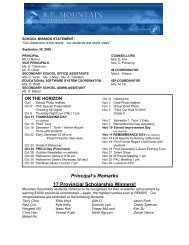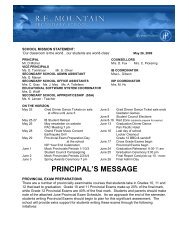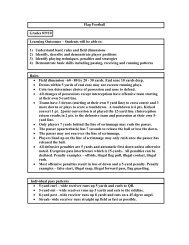Principal's Message IB Info Night @ School Board Office
Principal's Message IB Info Night @ School Board Office
Principal's Message IB Info Night @ School Board Office
You also want an ePaper? Increase the reach of your titles
YUMPU automatically turns print PDFs into web optimized ePapers that Google loves.
PARENT CONNECT<br />
"Parent Connect" is R.E. Mountain's web service that allows parents direct access to the information<br />
about their children's course work, assignments, attendance and other information. If you are<br />
interested in accessing your child's school information on-line please contact Mr. Frank Flanagan by<br />
email at: fflanagan@sd35.bc.ca<br />
INTERNET TIPS FOR PARENTS<br />
Net Tip: Social Networking.<br />
Did you know that the Terms of Agreement for FaceBook require that the user is age 13 or<br />
older The reason for this is that FaceBook, like all other social networking sites, sells user<br />
information to other companies, (even the information that has been deemed private). Child<br />
Privacy Policies state that it is illegal to sell information about a child. Social Networking sites<br />
are too enormous to keep tabs of all their users, but, if there is a problem regarding age, Social<br />
Networking sites look to the parents who are responsible for their children’s actions.<br />
Caution: if your child is obsessed with having a social networking page they might create one in<br />
secret, which can lead to many problems! Solution – create a family social networking page and<br />
learn the ropes together.<br />
Net Tip: Computer Use<br />
For children, personal technology devices like computers, hand-held computers (i.e.<br />
“Blackberries”) and cell phones can provide a wealth of positive information and connection to a<br />
greater community. In many families, these are also providing convenient new ways for kids and<br />
grown-ups to keep in touch throughout the day and to consult with one another as plans and<br />
schedules change. However, unsupervised technology use can also open a world of temptation<br />
and misinformation on topics such as drugs, violence, sex, and other risky behaviors.<br />
Kids want and need the kind of trust between themselves and their parents and other caregiving<br />
adults that only a continuous pattern or regular, healthy give-and-take communication can<br />
establish. But parents also need to know that their trust isn’t being violated. Kids can’t always be<br />
counted on to use digital technologies appropriately. Sometimes they stumble into danger<br />
unknowingly. They need guidance and rules. Here are some tips to keep them on the right<br />
track:<br />
Limit your child’s time spent online, and put computers in a common area of the house so<br />
you can more easily monitor use.<br />
Be clear and consistent about what is off limits — including Web sites, chat rooms, games,<br />
blogs, or certain music downloads — and how to handle information promoting drugs or sex.<br />
Enforce the consequences. The more meaningful the consequence to the teen, the less<br />
likely they will break the rules. For example, if you catch your teen Instant Messaging<br />
(IM’ing) at the dinner table when there is a no-text rule, take their cell phone privileges away<br />
for a set amount of time.<br />
Learn about the digital devices your child uses.<br />
Net Tip: Cell Phones<br />
Nearly 7 in 10 teens have mobile phones and the latest models enable teens to stay in touch<br />
with friends and family through more than just a phone call. However, many parents don’t<br />
understand these newer phones and all their features, allowing their teens free rein over a<br />
potentially dangerous medium that for some kids becomes highly addictive.<br />
1. Establish rules for when and how often teens can use their cell phones – both at home, in<br />
public, (e.g. etiquette in the movie theatre!), and at school. Make sure you know what the<br />
school’s rules are regarding cell phones on premises.<br />
2. Negotiate an agreement with your kids that if they use more than a certain number of cell
















